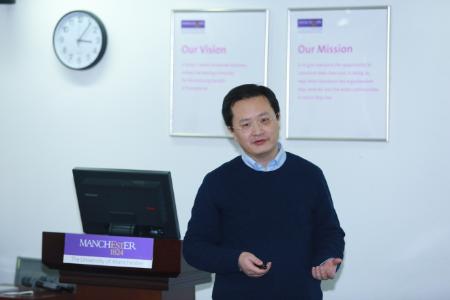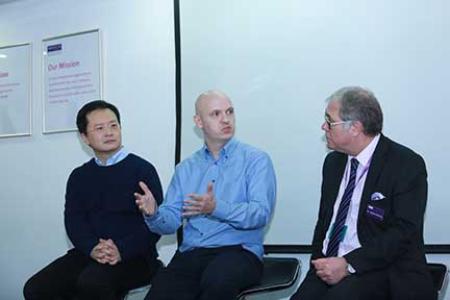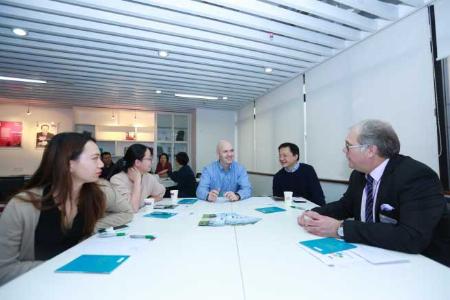The University of Manchester China Centre recently hosted a Healthcare Forum as part of a series of healthcare industry events. The forum was co-organised with Leadin Training Group and offered insights to general managers, HR directors, operations directors and physicians from the healthcare, medical technology and life sciences sectors, as well as students and alumni from the healthcare industry.
The Centre was honoured to host Dr. Stephen Brookes, Senior Fellow Public Policy and Leadership at Alliance Manchester Business School and Dr. Jian Li Head of Healthcare, Intel IoT Group, China (AI & Edge Computing for Health) to deliver keynote speeches on leadership and technology in healthcare, followed by a panel discussion with Dr. Jan Nyrup from Concord Medical.
Dr. Stephen Brookes, who is also the Programme Director for AMBS' blended-learning Master’s programme in International Healthcare Leadership, started his speech with the introduction of the concept ‘collective leadership’. This is an approach that can improve the overall impact of healthcare services, irrespective of whether it is private or public sector. From a leadership perspective, this style uses the best evidence in decision making, through collective expertise and systematic research that impacts the public good. The use of PESTLE analysis was kept as a comprehensive framework for considering the influence of political, economic, social, technological, legal and environmental factors.
”Significant changes are being proposed across most elements of Chinese healthcare, and a key aim is to improve the quality of care through primary mechanisms with an intention to train general practitioners and allied health professionals. As we recognise in other international healthcare systems, a key priority is to encourage the development of healthcare leaders - clinicians and non-clinicians alike. This is particularly important in supporting the intended infrastructure reforms and, indeed, to ensure that prevention is given as much priority as treatment," said Dr. Brookes.
Following this discussion about leadership in healthcare, Dr. Jian Li, who gained his Global MBA from Alliance Manchester Business School and founded The University of Manchester China Centre's alumni AI club, generously shared his industry knowledge of AI and the technological frontier in healthcare.
"Today, healthcare is not just a clinical topic that only healthcare professionals care about. There is a strong thirst for knowledge from the public on emerging healthcare trends and technologies (e.g. precision medicine, AI for health and future healthcare). And we also believe public adoption and engagement is a BIG driver for meaningful healthcare reform in China today," said Dr. Li.

“Several trends have been prominent in the use of AI technology in the healthcare domain, such as medical imaging analysis and diagnosis assistance; healthcare service/distance treatment; mobile and personal health tracking; advanced analytics and research such as MRIs; and personal health assistance via mobile apps," continued Dr. Li. "I strongly believe that future healthcare needs cross-discipline, data-driven and disruptive innovation mindsets and solutions.”
The two keynote speeches were very insightful from two inter-related perspectives, with the common purpose of seeking to improve healthcare and enhance healthcare practice and services to patients.
The panel discussion then welcomed Dr. Jan Nyrop from Concord Cancer Hospital. With over 10 years’ experience practicing medicine in China and now working with one of the top cancer hospitals in Asia, Dr. Nrop was able to bring a cross-cultural and cross-system view into the discussion. Contrasting European, Chinese and public, private and hybrid healthcare solutions stimulated interesting opinions.

The leadership aspect was given special attention during the Q&A session, including how to lead and manage different types of professionals in healthcare practice, research and development. Contrasting views were presented by Dr. Brookes and Dr. Li regarding future trends in Chinese healthcare – and whether primary and integrated care or distance diagnostics will play a greater role.

Technology is revolutionising the way that both healthcare and education are delivered and The University of Manchester China Centre holds the belief “No barriers, No boundaries”. The new part-time blended-learning MSc International Healthcare Leadership (MSc IHL) is tailored for healthcare professionals and those who wish to venture into the industry, and applications for the programme are now open.

